SAMPLE VISUALLY ANNOTATED INFORMATIVE SPEECH: Freeganism: More Than a Free Lunch
SAMPLE VISUALLY ANNOTATED INFORMATIVE SPEECH
Freeganism: More Than a Free Lunch
DJ McCABE
This informative speech by DJ McCabe describes a movement or cause that might be unfamiliar to his audience. To ensure understanding, he is careful to define any potentially confusing or unknown terms, including, of course, the topic term freeganism. DJ provides a short but effective preview of his thesis and main points, which serves both to create interest in the topic and to signal how the speech will be organized—in this case topically. With strong supporting material in the form of examples and statistics and a compelling conclusion based on a story of a real-life freegan, DJ is able to convey a great deal of information in an engaging way.
 Beginning the speech with a rhetorical question is an effective attention-getter, especially since most people do know someone who is vegetarian.
Beginning the speech with a rhetorical question is an effective attention-getter, especially since most people do know someone who is vegetarian.
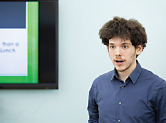
How many people in this audience consider themselves—or know someone who is—vegetarian? How about vegan?  If you’re not familiar with veganism, it’s the form of strict vegetarianism in which individuals do not eat food containing any animal products, including dairy, eggs, or honey. Although some vegans choose this dietary lifestyle for health reasons, most do so for ideological reasons, ranging from a commitment to animal rights to concerns about pollution resulting from animal farming.
If you’re not familiar with veganism, it’s the form of strict vegetarianism in which individuals do not eat food containing any animal products, including dairy, eggs, or honey. Although some vegans choose this dietary lifestyle for health reasons, most do so for ideological reasons, ranging from a commitment to animal rights to concerns about pollution resulting from animal farming. 
 DJ takes care to define terms that may not be familiar to the audience, or about which they have an incomplete understanding.
DJ takes care to define terms that may not be familiar to the audience, or about which they have an incomplete understanding.

To many of you, this may seem like an extreme lifestyle choice. However, there are people who take things a step beyond veganism. How many of you are familiar with the term freegan? According to the website Freegan.info, freegan is a combination of free and vegan. Freegans look for free products—from food to furniture—to minimize the impact of human consumerism on both the planet and other people. In fact, not all freegans are vegan; it is the “free” part that is key. Freegans oppose our consumer culture, in which we buy things we don’t need and throw away things that are still usable.
 Here is DJ’s preview statement, in which he states the thesis and main points. He also signals how he will organize the speech—in this case topically, or by focusing on different categories of his topic.
Here is DJ’s preview statement, in which he states the thesis and main points. He also signals how he will organize the speech—in this case topically, or by focusing on different categories of his topic.

During this presentation, I will introduce you to the freegan lifestyle—what the Freegan.info website defines as “living based on limited participation in” capitalism and “minimal consumption of resources.”  I will first describe a few of the ways that freegans try to minimize their use of resources, then discuss the reasons why some people choose to live this way, and finally explore some legitimate criticisms of the freegan lifestyle.
I will first describe a few of the ways that freegans try to minimize their use of resources, then discuss the reasons why some people choose to live this way, and finally explore some legitimate criticisms of the freegan lifestyle.
 DJ uses the signal word “first” to transition into the body of the speech.
DJ uses the signal word “first” to transition into the body of the speech.
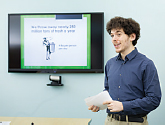
 Even though this is an informative speech, it contains elements of persuasion, just as persuasive speeches also inform.
Even though this is an informative speech, it contains elements of persuasion, just as persuasive speeches also inform.
First, the heart of freeganism is a commitment to using fewer resources, and one way to do that is to throw away less trash.  As reported in a 2007 article in the New York Times by Steven Kurutz, the Environmental Protection Agency found that we throw away nearly 250 million tons of trash per year, which translates to over 4 pounds on average, per person, every single day. Two freegan practices—waste minimization and waste reclamation—specifically deal with trash and seek to reduce the amount of garbage Americans produce every year.
As reported in a 2007 article in the New York Times by Steven Kurutz, the Environmental Protection Agency found that we throw away nearly 250 million tons of trash per year, which translates to over 4 pounds on average, per person, every single day. Two freegan practices—waste minimization and waste reclamation—specifically deal with trash and seek to reduce the amount of garbage Americans produce every year.
Many of us already support one of the tenets of freeganism—waste minimization—through recycling; hopefully everyone in this room today will take the time to throw their empty plastic water bottles and soda cans into a recycling container.  But minimizing waste isn’t just about recycling. Freegans also reuse everything they can, like using that old mayonnaise jar to hold pens and pencils instead of buying a specially designed pencil holder; this option reduces the demand for resources to make the specialty item and also eliminates the need for energy consumed during recycling.
But minimizing waste isn’t just about recycling. Freegans also reuse everything they can, like using that old mayonnaise jar to hold pens and pencils instead of buying a specially designed pencil holder; this option reduces the demand for resources to make the specialty item and also eliminates the need for energy consumed during recycling. 
 DJ provides plenty of concrete examples that both enlarge understanding and add color and interest.
DJ provides plenty of concrete examples that both enlarge understanding and add color and interest.

 DJ encourages engagement in her topic by showing the topic’s relevance to the audience members’ own lives.
DJ encourages engagement in her topic by showing the topic’s relevance to the audience members’ own lives.
Waste reclamation is just a formal term for what many of us know affectionately as “Dumpster diving.” You’ve engaged in this truly free acquisition of items that other people have thrown away if you furnished your dorm or apartment with a chair or a bookcase that someone left on the curb or in a Dumpster.  But would you consider making your meals out of what other people throw away? Freegans do.
But would you consider making your meals out of what other people throw away? Freegans do.  In his article on food waste, Robert Fireovid notes a U.S. Department of Agriculture finding: In 2008, the amount of food wasted by restaurants and stores averaged 275 pounds per American, not including what we throw away at home.
In his article on food waste, Robert Fireovid notes a U.S. Department of Agriculture finding: In 2008, the amount of food wasted by restaurants and stores averaged 275 pounds per American, not including what we throw away at home.  For freegans, this is unnecessary waste, and so they will reclaim any still-edible food along with other household items.
For freegans, this is unnecessary waste, and so they will reclaim any still-edible food along with other household items.
 DJ continues to directly engage listeners, this time by acknowledging that most in the audience probably wouldn’t engage in the more radical practices of freeganism.
DJ continues to directly engage listeners, this time by acknowledging that most in the audience probably wouldn’t engage in the more radical practices of freeganism.
 When citing this finding DJ should have mentioned the name of the publication, which is the journal Agricultural Research.
When citing this finding DJ should have mentioned the name of the publication, which is the journal Agricultural Research.
 DJ offers trustworthy sources throughout the speech.
DJ offers trustworthy sources throughout the speech.
If you think it sounds gross to eat food that has been thrown away by someone else, there are certainly legitimate worries about illness from spoiled food. At the same time, recent research shows that a lot of the food thrown away by grocery stores, for example, is perfectly safe to eat. A 2013 report published by the Natural Resources Defense Council and the Harvard Law School Food Law and Policy Clinic noted that $900 million in food was thrown away by retailers in 2001 because the date listed on the product had expired.  Those date labels often refer to the date until which the product will retain its highest quality, not necessarily the date after which the food is no longer safe to eat. That same report confirms that “the FDA’s Center for Food Safety and Applied Nutrition has noted that most foods, when kept in optimal storage conditions, are safe to eat and of acceptable quality for periods of time past the label date.”
Those date labels often refer to the date until which the product will retain its highest quality, not necessarily the date after which the food is no longer safe to eat. That same report confirms that “the FDA’s Center for Food Safety and Applied Nutrition has noted that most foods, when kept in optimal storage conditions, are safe to eat and of acceptable quality for periods of time past the label date.”
 This rhetorical question serves as an effective transition to the next point.
This rhetorical question serves as an effective transition to the next point.
Yet even if freegans reclaim wasted food safely and are mindful of their health, why would people who could afford to buy food choose to dig it out of the trash? 
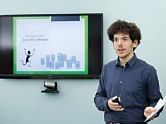
As defined at the beginning of my presentation, freegans try to avoid participating in capitalism, which they believe to be inherently exploitative. As the Freegan.info website puts it, “Instead of avoiding the purchase of products from one bad company only to support another, we avoid buying anything to the greatest degree we are able.” Although many health- and environmentally conscious people choose to shop at certain stores so that they can buy organic or fair-trade goods, freegans see even those efforts as problematic choices. Organic and fair-trade products still need to be shipped to stores, consuming fossil fuels and producing exhaust emissions in the process. And given the amount of food wasted unnecessarily in the United States, freegans feel an ethical obligation not to contribute to increased consumer demand when so much of the existing supply is already unused.
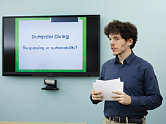
Despite their noble commitment to environmentalism and advocacy of a more humane economic system, freegans are not without critics. In some cities, Dumpster diving is illegal under municipal codes against trespassing and vandalism, although those laws are not often enforced against people “reclaiming” waste from Dumpsters unless the divers create a mess or property owners actively seek to have anti-trespassing laws applied. Harsher objections come from critics who argue that the freegan lifestyle does little to help the truly impoverished and may literally take food out of their mouths. In the words of Jerry Adler in a 2007 Newsweek article, “The freegans, most of whom are educated and capable of contributing to the economy, aren’t sharing the surplus wealth of the West with those who are destitute by circumstance rather than choice. They are competing with them for it.” Given both the small number of Americans who choose to live as freegans and the enormous amount of food wasted in this country, freegans are not very likely to consume all of the still-edible food thrown away by stores and restaurants. But their small numbers also mean they are not likely to have a significant impact on the environmental and economic problems their freegan lifestyle hopes to combat.
 DJ signals the conclusion of the speech.
DJ signals the conclusion of the speech.
During this speech, I have introduced you to the subculture of freegans in the United States.  Through their practices of waste minimization and waste reclamation, freegans hope to avoid the negative impacts of capitalist consumption on both the environment and people. Whether freegans are prophets of a better world or naive idealists living on other people’s trash remains an open question, but I hope that the next time you see someone exploring a Dumpster behind a supermarket, you remember that some people do so by choice rather than because it is their only option. And so I want to close by introducing you to one woman who made that choice.
Through their practices of waste minimization and waste reclamation, freegans hope to avoid the negative impacts of capitalist consumption on both the environment and people. Whether freegans are prophets of a better world or naive idealists living on other people’s trash remains an open question, but I hope that the next time you see someone exploring a Dumpster behind a supermarket, you remember that some people do so by choice rather than because it is their only option. And so I want to close by introducing you to one woman who made that choice.
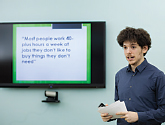
 Concluding the speech with a real-life story of a freegan gives the topic even more relevance and leaves the audience with something to think about.
Concluding the speech with a real-life story of a freegan gives the topic even more relevance and leaves the audience with something to think about.
As described in the 2007 New York Times article by Steven Kurutz, Madeline Nelson lived a life to which many of us aspire, making over $100,000 per year as a communications director for Barnes & Noble bookstores. Frustrated that her job and daily life continued to reinforce the rat race of buying “stuff” only to throw it away before buying more, in 2005 Ms. Nelson sold her posh Manhattan apartment in favor of a small place in Brooklyn and quit her corporate job so she could live as a freegan. When asked if she misses the extravagances that once filled her life, she responds, “Most people work 40-plus hours a week at jobs they don’t like to buy things they don’t need.” We might not wish to become freegans ourselves, but Madeline’s life is quite literally food for thought. 
References
Adler, J. (2007, October). The noble scavenger on the living-room couch. Newsweek, 150(14), 48.
Fireovid, Robert L. (2013). Wasted food: What we are doing to prevent costly losses. Agricultural Research, 61(3), 2.
Kurutz, Steven. (2007, June 21). Not buying it. The New York Times. Retrieved from www.lexis-nexis.com
Leib, E. B., Gunders, D., Ferro, J., Nielsen, A., Nosek, G., & Qu, J. (2013, September). The dating game: How confusing food date labels lead to food waste in America. Retrieved from www.nrdc.org/food/files/dating-game-report.pdf
What is a freegan? (n.d.). Retrieved from http://freegan.info